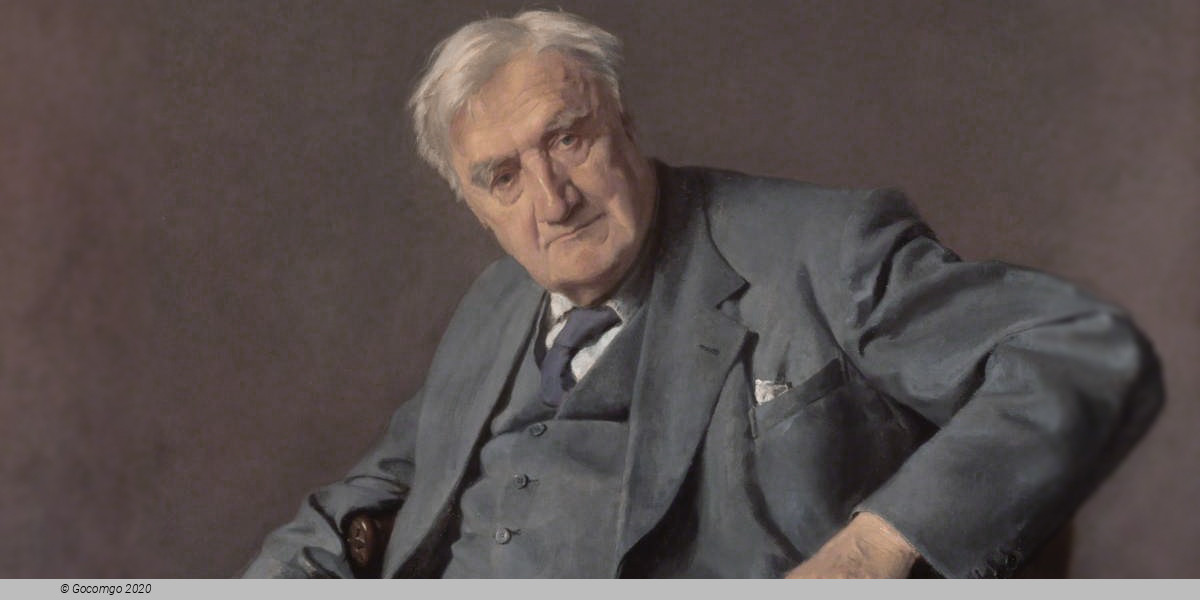Events3 results
About
Ralph Vaughan Williams was an English composer. His works include operas, ballets, chamber music, secular and religious vocal pieces and orchestral compositions including nine symphonies, written over sixty years. Strongly influenced by Tudor music and English folk-song, his output marked a decisive break in British music from its German-dominated style of the 19th century.
Vaughan Williams was born to a well-to-do family with strong moral views and a progressive social outlook. Throughout his life he sought to be of service to his fellow citizens, and believed in making music as available as possible to everybody. He wrote many works for amateur and student performance. He was musically a late developer, not finding his true voice until his late thirties; his studies in 1907–1908 with the French composer Maurice Ravel helped him clarify the textures of his music and free it from Teutonic influences.
Vaughan Williams is among the best-known British symphonists, noted for his very wide range of moods, from stormy and impassioned to tranquil, from mysterious to exuberant. Among the most familiar of his other concert works are Fantasia on a Theme by Thomas Tallis (1910) and The Lark Ascending (1914). His vocal works include hymns, folk-song arrangements and large-scale choral pieces. He wrote eight works for stage performance between 1919 and 1951. Although none of his operas became popular repertoire pieces, his ballet Job: A Masque for Dancing (1930) was successful and has been frequently staged.
Two episodes made notably deep impressions in Vaughan Williams's personal life. The First World War, in which he served in the army, had a lasting emotional effect. Twenty years later, though in his sixties and devotedly married, he was reinvigorated by a love affair with a much younger woman, who later became his second wife. He went on composing through his seventies and eighties, producing his last symphony months before his death at the age of eighty-five. His works have continued to be a staple of the British concert repertoire, and all his major compositions and many of the minor ones have been recorded.
Music
Michael Kennedy characterises Vaughan Williams's music as a strongly individual blending of the modal harmonies familiar from folk‐song with the French influence of Ravel and Debussy. The basis of his work is melody, his rhythms, in Kennedy's view, being unsubtle at times. Vaughan Williams's music is often described as visionary; Kennedy cites the masque Job and the Fifth and Ninth Symphonies. Vaughan Williams's output was prolific and wide-ranging. For the voice he composed songs, operas, and choral works ranging from simpler pieces suitable for amateurs to demanding works for professional choruses. His comparatively few chamber works are not among his better known compositions. Some of his finest works elude conventional categorisation, such as the Serenade to Music (1938) for sixteen solo singers and orchestra; Flos Campi (1925) for solo viola, small orchestra, and small chorus; and his most important chamber work, in Howes's view—not purely instrumental but a song cycle—On Wenlock Edge (1909) with accompaniment for string quartet and piano.
In 1955 the authors of The Record Guide, Edward Sackville-West and Desmond Shawe-Taylor, wrote that Vaughan Williams's music showed an exceptionally strong individual voice: Vaughan Williams's style is "not remarkable for grace or politeness or inventive colour", but expresses "a consistent vision in which thought and feeling and their equivalent images in music never fall below a certain high level of natural distinction". They commented that the composer's vision is expressed in two main contrasting moods: "the one contemplative and trance-like, the other pugnacious and sinister". The first mood, generally predominant in the composer's output, was more popular, as audiences preferred "the stained-glass beauty of the Tallis Fantasia, the direct melodic appeal of the Serenade to Music, the pastoral poetry of The Lark Ascending, and the grave serenity of the Fifth Symphony". By contrast, as in the ferocity of the Fourth and Sixth Symphonies and the Concerto for Two Pianos: "in his grimmer moods Vaughan Williams can be as frightening as Sibelius and Bartók".



